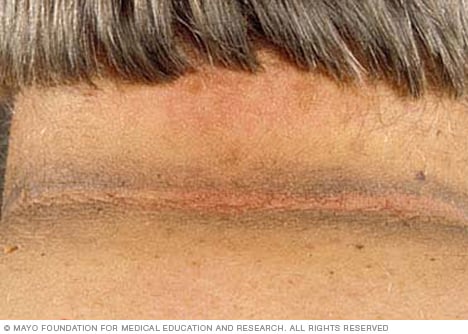Overview
Acanthosis nigricans is a skin condition characterized by areas of dark, velvety discoloration in body folds and creases. The affected skin can become thickened. Most often, acanthosis nigricans affects your armpits, groin and neck.
The skin changes of acanthosis nigricans (ak-an-THOE-sis NIE-grih-kuns) typically occur in people who are obese or have diabetes. Children who develop the condition are at higher risk of developing type 2 diabetes. Rarely, acanthosis nigricans can be a warning sign of a cancerous tumor in an internal organ, such as the stomach or liver.
Scroll Down for Link
No specific treatment is available for acanthosis nigricans. Treatment of underlying conditions may restore some of the normal color and texture to affected areas of skin.
Symptoms
Skin changes are the only signs of acanthosis nigricans. You'll notice dark, thickened, velvety skin in body folds and creases — typically in your armpits, groin and back of the neck. The skin changes usually appear slowly. The affected skin may also have an odor or itch.
When to see a doctor
Consult your doctor if you notice changes in your skin — especially if the changes appear suddenly. You may have an underlying condition that needs treatment.
Causes
Acanthosis nigricans has been associated with:
- Insulin resistance. Most people who have acanthosis nigricans have also become resistant to insulin. Insulin is a hormone secreted by the pancreas that allows your body to process sugar. Insulin resistance is what eventually causes type 2 diabetes.
- Hormonal disorders. Acanthosis nigricans often occurs in people who have disorders such as ovarian cysts, underactive thyroids or problems with the adrenal glands.
- Certain drugs and supplements. High-dose niacin, birth control pills, prednisone and other corticosteroids may cause acanthosis nigricans.
- Cancer. Acanthosis nigricans also sometimes occurs with lymphoma or when a cancerous tumor begins growing in an internal organ, such as the stomach, colon or liver.
Risk factors
Acanthosis nigricans risk factors include:
- Obesity. The heavier you are, the higher your risk of acanthosis nigricans.
- Race. Studies show that in the United States, acanthosis nigricans is more common among Native Americans.
- Family history. Some types of acanthosis nigricans appear to be hereditary.
Complications
People who have acanthosis nigricans are much more likely to develop type 2 diabetes
Diagnosis
Acanthosis nigricans is typically detected during a skin exam. Rarely, a small skin sample is removed (biopsied) for examination in a lab. If the cause of acanthosis nigricans is unclear, your doctor may recommend blood tests, X-rays or other tests to look for possible underlying causes.
Treatment
In many situations, treating the underlying problem can help fade the discoloration. Examples may include:
- Losing weight. If your acanthosis nigricans is caused by obesity, losing weight may help.
- Stopping medications or supplements. If your condition seems to be related to a medication or supplement that you use, your doctor may suggest that you stop using that substance.
- Having surgery. If acanthosis nigricans was triggered by a cancerous tumor, surgically removing the tumor often clears up the skin discoloration.
If you are concerned about the appearance of your skin or if the lesions become uncomfortable or start to smell bad, your doctor may suggest:
- Prescription creams to lighten or soften the affected areas
- Antibacterial soaps, used gently, as scrubbing could worsen the condition
- Topical antibiotic
- Oral acne medications
- Laser therapy to reduce the skin's thickness
Preparing for your appointment
You're likely to start by seeing your family doctor. He or she may refer you to a doctor who specializes in skin disorders (dermatologist) or hormone problems (endocrinologist). Because appointments can be brief and there's often a lot of ground to cover, it's a good idea to be well-prepared for your appointment.
What you can do
Before your appointment, you may want to list answers to the following questions:
- Has anyone in your family ever had this problem?
- Does diabetes run in your family?
- Have you ever had problems with your ovaries, adrenal glands or thyroid?
- What medications and supplements do you take on a regular basis?
- Have you ever had to take high doses of prednisone for more than a week?
What to expect from your doctor
Your doctor is likely to ask you a number of questions. Being ready to answer them may reserve time to go over any points you want to spend more time on. Your doctor may ask:
- When did your symptoms begin?
- Have they gotten worse?
- What areas of your body are affected?
- Have you ever had cancer?

Comments
Post a Comment